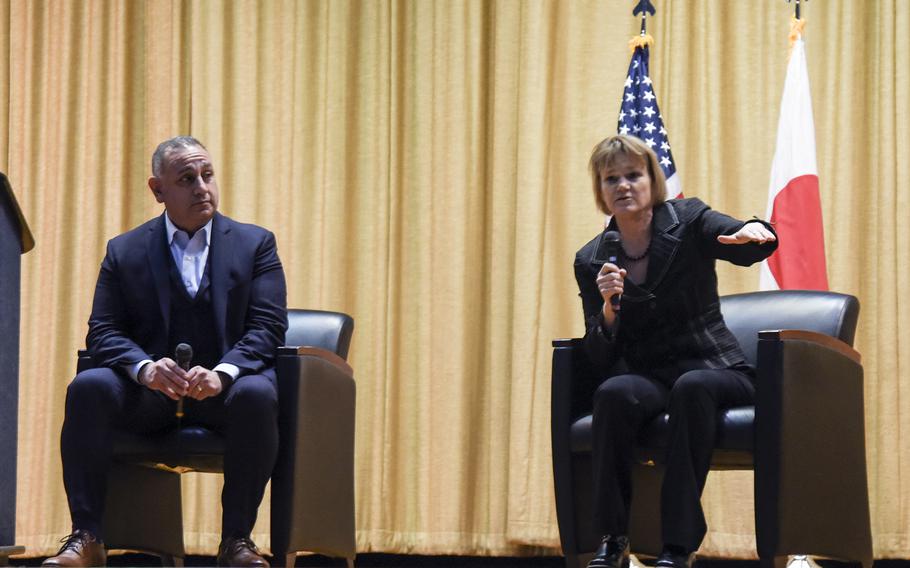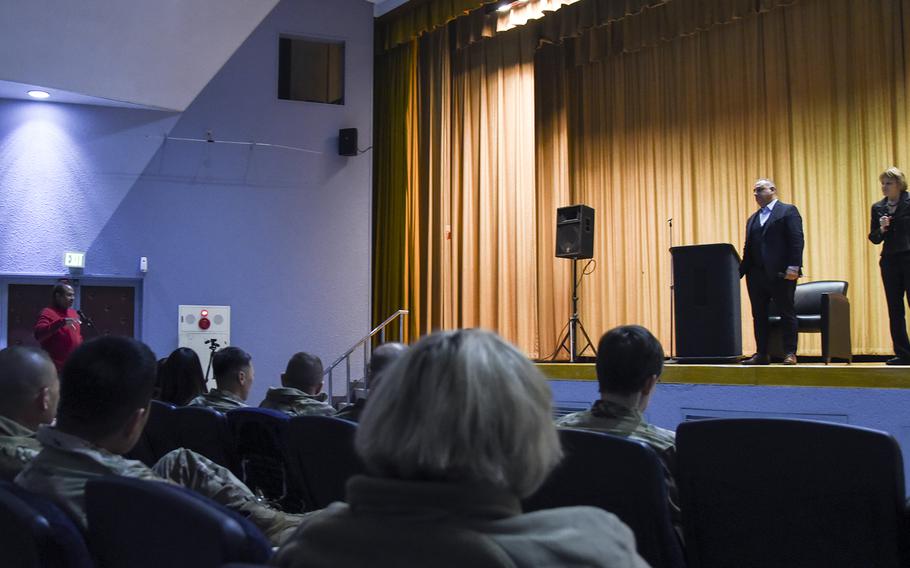
Gilbert Cisneros Jr., undersecretary of defense for personnel and readiness, and Seileen Mullen, acting assistant secretary of defense for health affairs, answer questions about civilians' access to medical care during a town hall at Yokota Air Base, Japan, Monday, Jan. 30, 2023. (Kelly Agee/Stars and Stripes)
YOKOTA AIR BASE, Japan — Pentagon officials at a town hall Monday on this airlift base in western Tokyo offered few answers to hundreds of Defense Department civilian employees questioning their loss of access to military health care.
Gilbert Cisneros Jr., undersecretary of defense for personnel and readiness, and Seileen Mullen, acting assistant secretary of defense for health affairs, hosted the hourlong town hall at the base theater.
Working groups behind the scenes at the Pentagon in Washington, D.C., are looking for solutions to the health care problem in Japan, Mullen said during the session.
DOD employees lost access to ongoing medical care at U.S. bases in Japan for most chronic conditions Jan. 1, when the Defense Health Agency implemented a congressional mandate to prioritize treatment for active-duty service members, their families and others covered by the military health plan Tricare Prime. Some services are still available, including urgent care and labor and delivery.
“So, we have come up with some solutions,” Mullen said to about 400 people, twice the number at a previous town hall here on the same subject Jan. 5. “But we have not come up with anything permanent yet because we wanted to come out and find out what you all think of what your issues are, and are the things that we're thinking about actually going to meet your needs.”

Gilbert Cisneros Jr., undersecretary of defense for personnel and readiness, and Seileen Mullen, acting assistant secretary of defense for health affairs, answer questions about civilians' access to medical care during a town hall at Yokota Air Base, Japan, Monday, Jan. 30, 2023. (Kelly Agee/Stars and Stripes)
At previous town halls at Yokota and Marine Corps Air Station Iwakuni earlier this month and at Yokosuka Naval Base south of Tokyo in December, DOD civilians complained, among other issues, of DHA’s short notice of the change, the impracticality of the space-available appointment regimen now in place at U.S. military hospitals for DOD employees in Japan, and the unpredictable nature of obtaining medical care from Japanese providers. Some civilian employees of Stars and Stripes are affected by the changes.
The DHA Indo-Pacific director, Army Maj. Gen. Joseph Heck, in October advised DOD civilians and their families in Japan to find ongoing medical care from Japanese providers.
However, neither the Japanese government nor the country’s health care providers were formally apprised before Jan. 1 of the changes to health care for U.S. civilians in Japan, a spokesman for U.S. Forces Japan, Marine Gunnery Sgt. Jonathan Wright, told Stars and Stripes in an email Friday.
The reaction by DOD civilians — teachers, contractors, employees at base exchanges and commissaries, for example — caused a stir in Washington.
The Japan Civilian Medical Advocacy, a Facebook group, started a petition drive asking Congress to rethink the changes; it has so far gathered 2,460 signatures. The group also conducted email and phone campaigns to further stoke attention among their congressional representatives.
Sen. Elizabeth Warren, D-Mass., a member of the Senate Armed Services Committee, wrote Mullen and DHA’s newly appointed director, Army Maj. Gen. Telita Crosland, on Jan. 23 questioning the motive and asking the agency to justify cutting DOD employees in Japan out of the military health care system.
But Pentagon phones started to ring in October after Heck announced the DHA changes in the Pacific, Mullen said. U.S. Ambassador to Japan Rahm Emanuel traveled to Washington to confer with Defense Secretary Lloyd Austin about the change.
“OK, time to pay attention to what the heck is going on in Japan,” Mullen said.
On Tuesday, Mullen and Cisneros are scheduled for similar town halls in the morning at Yokosuka and in the afternoon at Camp Zama, the headquarters southwest of Tokyo of U.S. Army Japan.